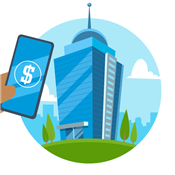GROUNDFLOOR Review
Groundfloor offers short-term real estate investments starting with just $10. With average returns over 10%, is it the right investment for you?
 | |||
Invest in Real Estate with $10 | |||
Overall Score | 4.2 | ||
Minimum Deposit | 5.0 | ||
Commissions and Fees | 5.0 | ||
Customer Service | 4.0 | ||
Ease of Use | 4.0 | ||
Liquidity | 3.0 | ||
Pros and Cons
- No investor fees
- High historical returns
- $10 minimum
- Risk of default
- Debt investments only (no equity)
Bottom Line
Crowdfunding platform for passive investors looking for short-term real estate debt investments
Real estate crowdfunding is hot right now. But a big downside is that your money is often tied up for 5 years or more.
Not everyone wants their money locked up like that. If that sounds like you, Groundfloor may be your answer.
Most platforms invest in multi-year large commercial projects. But Groundfloor lets you lend money to borrowers for housing projects that last just 12 to 18 months.
Is it better than platforms like Fundrise? Find out the pros, cons, and returns in this review.
What is Groundfloor?
Groundfloor is a real estate investment and lending platform for fix-and-flip and new construction residential projects. It's open to both investors and borrowers.
Investors provide loans to borrowers for fix-and-flip and to construct new housing projects. Each loan has a fixed interest rate and projected term. Borrowers use the money to renovate or build the house and then sell it.
This investment model is attractive for both parties. Borrowers get access to quick loans that meet their needs and investors get relatively safe, real estate-backed returns. Over its 10 years history, Groundfloor has delivered investors 10% annualized returns.
Groundfloor's stats to date show strong performance since its inception in 2013:
| Number of investors | 250,000+ |
| Average returns to date | 10+% |
| Total interest earned by investors | $12,693,868 / $54.6M(all time) |
| Total investment volume | $1.3B (all time) |
| Total loans originated / closed | 4,879 |
| Average loan size | $223,000 |
Groundfloor has opened up ownership of the company to the public multiple times via its own platform and other crowdfunding platforms, and is now over 30% owned by the public. But their securities aren't currently trading on any of the public exchanges.
Invest in Real Estate with $10
- Short-term real estate investments lasting just 12-18 months
- Open to non-accredited investors
- No investor fees
What Makes Groundfloor Different
 |
Groundfloor stands out from other real estate crowdfunding platforms. Here's why:
- Debt instead of equity
You're investing in loans, so you already know the interest rate and terms. This is different from equity, which means you own a piece of the property. Your returns don't depend on how much it goes up in value. - Short time frame
Because other platforms depend on property appreciation, you usually need to wait at least 5 years. But Groundfloor's loans are short (typically 12 to 18 months). You can get a quick return on your investment. - No fees
Other platforms like Fundrise offer funds and charge fees to investors. Groundfloor offers fee-free investing with a minimum investment of just $10, so it's a much lower barrier to entry. - Choose Automated Investing or Customization
With Groundfloor, you can make your own direct investments and build your own portfolio through the Investor Account.With Groundfloor's latest Auto Investor Account (rolled out in fall 2023), funds are automatically invested and diversified across all available loans as soon as they hit your account. This can help you see repayments in as little as seven days.
Who Can Invest on Groundfloor
Groundfloor is open to all investors. There are no accreditation or wealth requirements.
Groundfloor may be right for you if:
- You don't want a long multi-year investment
- You only have a little bit of money to invest
- You want true automatic investing
- You want to invest in debt instead of equity
- You want to see repayments come in sooner
- You want the option of higher risk for more potential rewards
Groundfloor is open to investors in all 50 states except for Nebraska residents (due to state-specific legislation).[1]
Diversify Your Portfolio
With Groundfloor you can diversify your investment portfolio with real estate like a pro without needing to be a millionaire.
Groundfloor Pros and Cons
 |
Pros
- No investor fees
- High historical returns 10+%
- Short term investments (12 to 18 months)
- Starts at $10
- Ability to automatically invest and diversify
- Open to all investors (don't need to be accredited)
- No prior real estate knowledge required with automated diversification
Cons
- Risk of default
- Limited to debt investments (no equity)
- No diversification opportunities outside of residential real estate
Real Estate Investing for Everyone
$10 minimum short-term high-yield investments
If you want more diversification across real estate categories, Fundrise may be better for you. Fundrise automatically invests for you in a wide range of residential, commercial, and industrial real estate projects across the US. This exposes you to more markets and potentially higher returns.
How Groundfloor's Loan Process Works
Here's a quick look at how Groundfloor's loan process works:
- The borrower submits a loan application. Every loan goes through a stringent underwriting process.
The loan grade Groundfloor assigns depends on many factors, like:[3]
- Loan-to-value ratio
- Location of house
- Quality of valuation report
- Borrower experience
- Borrower Commitment
- How much skin-in-the-game the borrower has
- Loan-to-value ratio
- Groundfloor gives the borrower an initial payment (called pre-funding) so they can start the project.
- Groundfloor then converts the loans into securities with the SEC. Once qualified, the public can start investing in them for only $10. You're actually investing in a Limited Recourse Obligation (LRO).
- During the project, Groundfloor carefully monitors the progress. They try to resolve problems if anything goes off-track.
- When the project is complete, the house is put on the market. The borrower uses funds from the sale to pay back the loan in full. Groundfloor then distributes that to the investors.
Because you are automatically invested and diversified across dozens or even hundreds of projects, you may start to see repayments in as little as seven days.
Short Term High-Yield Real Estate Debt Investments
Groundfloor offers short-term, high-yield real estate debt investments to the general public.
How to Start Investing on Groundfloor
From an investor's point of view, here's what you need to know:
- Create an account:
You can sign for free and view the available projects. There are no investor fees and the minimum investment is just $10. - Fund your account:
Link an external bank account to transfer funds. Fund with a minimum initial bank transfer of $10. It takes about 3-5 business days for transfers to clear. - Enjoy automatic investing:
Groundfloor's mobile-first approach makes investing easy and accessible via its app, available on desktop or mobile browser. With the app, your funds will be automatically and instantly invested as soon as they reach your account.The Groundfloor app allows you to:- View your accrued interest
- See total loans you're invested in
- Access details of your returns
- Check your average realized returns & more
- View your accrued interest
- Receive payments:
You get either monthly interest payments or deferred payment after project completion. When the borrower has repaid all the principal and outstanding interest, you'll get your investment back in a lump sum.With Groundfloor's Auto Investor Account, you can see repayments in as little as seven days. Your funds will also be automatically reinvested in another batch of available loans.
To withdraw funds, set a passive income target, and repayments will temporarily stop auto reinvesting until that target is met.
Invest in Real Estate with $10
- Short-term real estate investments lasting just 12-18 months
- Open to non-accredited investors
- No investor fees
Automated Investing
Groundfloor also offers an automatic investing feature with its Auto Investor Account. This is great for true set-it-and-forget-it investing. Here's how it works:
- Set up a recurring transfer schedule. You can schedule it as a weekly, biweekly, monthly, and semimonthly transfer.
![]()
- Create your portfolio by entering how much you want to invest.
- Whenever new loans go live, your funds will automatically be invested across dozens or hundreds of loans as soon as they transfer.
- Your repayments will also be auto invested into new loans.
Automatic investing is a great way to invest without thinking. All your excess cash is automatically put to work. You don't need to keep on logging in and actively select investments yourself.
The Groundfloor app can be found in both the Apple Store for iOS devices and Google Play for Android devices.
What are Groundfloor's fees?
Groundfloor does not charge its investors any fees. This sets them apart from other real estate crowdfunding platforms.
They instead make all their money from the fees they charge their borrowers. Fees for borrowers are:
- 2.75% to 4% of the amount of the loan
- $495 application fee
How Much Returns Can You Expect?
The average returns to date is 10+%. Interest rates go from 5% to 15%. How much you can make depends on your own risk tolerance and the loans you select.
Are Loans Risky on Groundfloor?
Groundfloor has a stringent underwriting process to reduce risk for investors. It also works closely with borrowers to make sure their projects are on track.
All loans are backed by the actual property. They're full recourse loans with personal guarantees. In the event of default, Groundfloor has legal claim to the property plus the borrower's personal wealth. So the risk of losing all your principal is low.
In 2022, Groundfloor repaid loans on 849 properties. And only 14 loans were repaid with a loss of principal.[4]
The biggest risk is a default. If renovations are more difficult or costly than planned, this could delay or end the project. If a loan is not repaid on time, you continue to earn interest payments until the loan is fully paid off.[5]
In very rare cases, a foreclosure may be necessary as a last resort. Investors will get their share back from the sell.
Is Groundfloor a Good Investment?
Groundfloor is a solid addition to any diversified portfolio. They boast average returns of just above 10%. This is on par with other real estate investments.
It's a good investment if you want to invest in debt instead of equity. You don't need to wait for years for the property to appreciate in value. You can see a quick return, even in as little as seven days.
There's no accreditation requirements and only require $10. So it's also a good option for small investors.
But as with all investments, there is risk. But having the actual house as collateral will reduce your losses.
You can reach Groundfloor customer service Monday through Friday 9am-5pm EST by:
- Phone: (404) 850-9223
- Email: support@groundfloor.us
How to Reduce Risk
Diversification is fundamental in any investment strategy. Groundfloor automatically invests your funds across a wide array of available loans, aiming to mitigate potential losses or risks.
By diversifying your investments, you can potentially reduce the impact of any single investment underperforming or facing difficulties.
It's also essential to conduct thorough research before investing to make informed decisions.
Groundfloor Alternatives
Groundfloor is unique because they offer short-term debt investments backed by actual properties. Most other real estate platforms only offer long-term equity investments.
Review Groundfloor's main competitors below before choosing where to invest.
 |  |  | |
| Visit Site | Visit Site | Visit Site | |
| Annual Fee | |||
|---|---|---|---|
| Minimum Deposit | |||
| Dividends | Choose quarterly payouts or auto reinvest | Monthly rental income dividends | |
| Investment Period | 5+ years (with opportunities to liquidate on a quarterly basis) | ||
| Investment Types | Commercial, single family, multi-family, industrial | ||
| Accredited Investor Requirements | |||
| Visit Site | Visit Site | Visit Site | |
| Terms Apply. | Terms Apply. | ||
GROUNDFLOOR: Investments carry risk and may lose value. Not an offer or solicitation to purchase securities. Please consult the Offering Circular and related SEC filings before making an investment decision. | |||
Groundfloor vs. Fundrise
Fundrise is perhaps the most popular real estate investing platform. The minimum to start is only $10 and it's open to everyone.[7]
Your money is automatically invested into a diversified portfolio of real estate projects across the US. You get a mix of commercial and industrial, debt and equity projects.
It also offers a hands-off approach to real estate investing, similar to Groundfloor, where you can set your investments and leave them to grow over time.
Both platforms boast historical returns of around 10%. But Fundrise's investor fees (~1%) are higher.[8]
Fundrise is meant to be a long term investment. But it does have an early redemption program (with a small fee), so there is some liquidity.[9]
Invest in Real Estate with $10+
- Only $10 minimum investment
- Get a diversified portfolio of real estate projects across the US
- Open to all investors
Groundfloor vs. PeerStreet
Of all the competition, PeerStreet is the most similar to Groundfloor. It lets you invest in short-term loans to borrowers for real estate projects.
But, Peerstreet is only for accredited investors. The minimum investment is $1,000.[10] And there is an asset management fee of around 1%.[11]
Most of the borrowers on PeerStreet are experienced real estate owners. They are seeking short-term financing to improve the quality and rentability of their properties.
At around 9%, the returns on PeerStreet are generally lower than the returns on Groundfloor. The risk is also lower. This is because PeerStreet borrowers are improving their existing properties as opposed to buying and flipping a house in disrepair.
Groundfloor vs Arrived Homes
Arrived Homes also lets you invest in residential homes, but it works differently from Groundfloor. Instead of lending money to borrowers, you actually own a little piece of a house. The minimum is only $100.
The idea is for investors to pool funds to invest in a rental house. Arrived will take care of the tenants, property managers, and maintenance. You don't need to worry about the day-to-day stuff.
You'll earn money from the rental income (approx. 3.0% to 7.2% annualized[12]), plus from the appreciation of the property itself.
Since this is an equity investment, expect to hold your investment for 5-7 years. There's no early redemption program yet (though it's in the works).
Arrived Homes has a 1% annual management fee. There's also a property management fee that's 8% of the rent.
Invest in Rental Homes with $100+
Browse rental home investments for free. No bank account required
Groundfloor FAQ
Who is the Groundfloor borrower?
Groundfloor borrowers are your typical real estate entrepreneur. They want to buy properties either to build new construction or to renovate a home in disrepair. Then they'll sell the property, hopefully at a profit.
They try to do all this as quickly as possible, generally within 12 to 18 months. Given the shorter time frame, a traditional mortgage can be too cumbersome. This is what makes Groundfloor a better option for raising funds.
Borrowers need a minimum credit score of 640. But previous flipping experience is not required.[13]
Is Groundfloor FDIC insured?
When you transfer funds to Groundfloor, the cash is held at partner bank and will be FDIC insured up to the federal limit. However, once they are invested into loans, they are no longer FDIC insured.
Is Groundfloor a REIT?
No, Groundfloor is not a REIT. Unlike investing in a fund of real estate projects, with Groundfloor, you're investing in individual loans to borrowers. Despite this, Groundfloor has achieved historical returns of 10% over 10+ years, surpassing traditional REITs.[14]
Bottom line: Is Groundfloor legit?
Groundfloor is legit. They are one of a few crowdfunding platforms that offer real estate-backed debt instead of equity. The 10% returns are on par with many equity real estate investments.
They offer all this with no investor fees, very low minimums, and no accreditation requirements.
But as with all investments, there is risk. The biggest risks are defaults (or even foreclosure). But having the actual house as collateral will reduce your losses.
Before making any investment, always make sure that you conduct thorough research and due diligence.
References
- ^ Groundfloor. Do I have to be an accredited investor to invest with GROUNDFLOOR?, Retrieved 4/5/2022
- ^ Groundfloor. Does GROUNDFLOOR allow investments from non-US residents?, Retrieved 4/5/2022
- ^ Groundfloor. Groundfloor's Loan Grading Factors, Explained, Retrieved 4/5/2022
- ^ Groundfloor. Asset Management Monthly Update - December 2022, Retrieved 2/4/2023
- ^ Groundfloor. What happens if a borrower defaults on a loan?, Retrieved 4/5/2022
- ^ Better Business Bureau. Groundfloor BBB Rating & Accreditation, Retrieved 2/4/2023
- ^ Fundrise. Minimum Initial Investment, Retrieved 8/9/2022
- ^ Fundrise. What are Fundrise's fees?, Retrieved 8/9/2022
- ^ Fundrise. Can I redeem at any time?, Retrieved 8/9/2022
- ^ PeerStreet. What is the minimum investment amount on PeerStreet?, Retrieved 8/9/2022
- ^ PeerStreet. What is PeerStreet's asset management fee?, Retrieved 8/9/2022
- ^ Arrived Homes. Historical Performance, Retrieved 9/8/22
- ^ Groundfloor. What are your lending guidelines?, Retrieved 2/4/2023
- ^ Groundfloor. Get Financially Fit in 2024, Retrieved 3/14/2023
Invest in Real Estate with $10
- Short-term real estate investments lasting just 12-18 months
- Open to non-accredited investors
- No investor fees
Invest in Real Estate with $10+
- Only $10 minimum investment
- Get a diversified portfolio of real estate projects across the US
- Open to all investors
Invest in Rental Homes with $100+
Browse rental home investments for free. No bank account required
Online Alternative Investments
- Exclusive access to private market investments
- Wide range of alternative investments like art, real estate, legal financing, and more
- Goal-based investing for growth or income
- Minimums starting from $10,000
Write to Andrew Fitzgerald at feedback@creditdonkey.com. Follow us on Twitter and Facebook for our latest posts.
Note: This website is made possible through financial relationships with some of the products and services mentioned on this site. We may receive compensation if you shop through links in our content. You do not have to use our links, but you help support CreditDonkey if you do.
Fundrise, LLC ("Fundrise") compensates CreditDonkey Inc for new leads. CreditDonkey Inc is not an investment client of Fundrise.
|
|
| ||||||
|
|
|
Compare:








